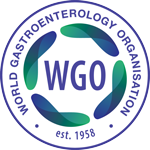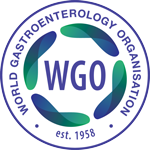Impact of Climate Change on Gastrointestinal Health and Diseases
Vol. 26, Issue 3 (December 2021)
 |
Geoffrey Metz, MBBS (Hons), FRACP
Secretary General, World Gastroenterology Organisation
Chair, Climate Change Working Group
Richmond, Australia
|
Background
While the possible effects of greenhouse gases on climate had been discussed by scientists for many decades, it was the NASA scientist James Hansen, in his submission to a US Senate Committee in 1988, who focused the US Senate and the United Nations on the threat climate change (CC) posed to humanity.
Later that year, the United Nations formed the Intergovernmental Panel on Climate Change (IPCC) to provide governments with scientific information that they can use to develop climate policies. Following IPCC advice, the United Nations Framework Convention on Climate Change was held in Rio de Janeiro in 1992, and parties to that convention then met in Berlin in 1995 for what was the first of a now annual Conference of the Parties or COP1. Twenty-six years later we have seen COP26 in Glasgow in November 2021.
The rapid industrial and economic development of the world since the Industrial Revolution has been associated with a rapid increase in the production of greenhouse gases, leading to global warming. Global warming is causing such severe climate changes that many see it as an existential threat.
Concurrently, as the science of global warming has become abundantly clear, sustainable development academics have worked to devise mechanisms for reduction of greenhouse gases and mitigation of the impact of climate change.
The Impact of Global Warming on Health and Disease
The scientists had accurately predicted that small rises in temperature would have severe flow-on effects on climate, which then have a multifactorial impact on health and disease.
The obvious outcome of warming is melting of polar ice-caps and glaciers around the world. This is leading to rising sea levels, not only sinking small island nations below sea level but inundating coastal towns and cities in countries all around the world.
Global warming was predicted to produce an increase in extreme weather including cyclones and floods, and this is clearly occurring. However, increasing temperature in most situations leads to drought, reduced crop production and reduced nutrient value of crops. The drying of land masses was predicted to produce increased wild fires and these have occurred at an unprecedented scale particularly across Europe, North America and Australia.
Monitoring of temperatures globally has revealed that the ten hottest years on record globally have all occurred since 2005, and the hottest six years on record have occurred in the last six years from 2015 to 2020 (National Oceanic and Atmospheric Administration, August 13, 2021, and verified by the United Kingdom Met Office and independently by the European Union, Copernicus Program).
All these changes are combining to lead to mass migration within countries and across borders.
Additionally, the practice of burning rainforests in order to open up more farming land not only produces more carbon dioxide from the burning forests but impedes the capacity to reduce atmospheric carbon dioxide through photosynthesis.
Farming of animals, particularly cattle and sheep, has a major impact on production of carbon dioxide and methane as well as land degradation.
What is the Role of the WGO in the Climate Change Debate?
The fact that human activity is now the major driver of global warming is no longer in dispute. Scientists have been increasingly concerned, as their predictions have all been shown to be correct. Business leaders and politicians, who initially doubted the veracity of the predictions, are now accepting that the relentless increase in global temperatures and extreme weather events are predominantly from human activity.
WGO has set up a Climate Change Working Group (CCWG) to research the data and then educate and advocate for change to mitigate the impact of CC. The first contribution from the CCWG is the commentary attached to this newsletter.
Populations across the world all need to look at how they are contributing to global warming. Our creation of greenhouse gases can be divided into our own personal behaviour, the contribution of our hospital or institution, and the contribution of the population in which we live nationally.
Personally, we contribute greenhouse gases in many ways. The International Energy Agency believes that around 55% of achievable emission reductions are linked to consumer choices.
For most of us, travel is the biggest contributor of personal emissions. This can be markedly reduced by changing from petrol or diesel to electric cars. If we attend a conference, we have a choice of attending online or in person, the latter often involving long distance travel.
Burning fossil fuels for home heating, cooling and cooking is the second greatest contributor. As the practice of using fossil fuels for home heating, cooling and cooking is changed to electric sources, and the production of electricity is changed from fossil fuels to renewable energy, particularly solar and wind, one’s personal carbon footprint is dramatically reduced.
We have the choice of decreasing consumption of animal products, especially beef and dairy, while increasing vegetarian components to our diet, creating a healthier option.
Our hospitals and institutions are major contributors of greenhouse gases.
We can campaign against waste and in favor of instruments and other hospital equipment produced with reduced greenhouse gas contribution and recycled whenever possible rather than sent for waste after a single use.
Nationally, we can use our position of influence to advocate for changes in policy at government levels that will lead to decreased greenhouse gas production with the objective of being carbon neutral by 2050 at the latest.
In the first instance, the CCWG is looking at assisting our member societies to introduce change at the personal and institutional level while helping our member societies to develop advocacy tools for influencing the broader community in the countries where they live.
The CCWG is also looking at the impact of CC on the gastrointestinal health of our patients in different regions. This will include nutritional health as well as the impact of infectious diseases and cancers and other conditions that are influenced by the effects of CC on our microbiota.
The decrease in availability of fresh water impacts hygiene and the decreased quantities of fresh water are being shared by an increasing world population.
Chemicals and pesticides used to enhance crop development are impacting gastrointestinal health as well as biodiversity, and further changes to the gut microbiota are predicted.
Each of the above issues are topics on the CCWG agenda, which will also include development of webcasts, power point presentations and other educational material to share with our member societies so that they can take up the issues related to the impact of climate change in their regions.
The World Gastroenterology Organisation is developing a program to collaborate with our member societies and other medical organisations to educate doctors and their patients, journalists and politicians, not only of the danger of climate change but ways we can help to reduce greenhouse gas production and improve health through both improved human nutrition and also identification of and mitigating diseases resulting from climate change.


